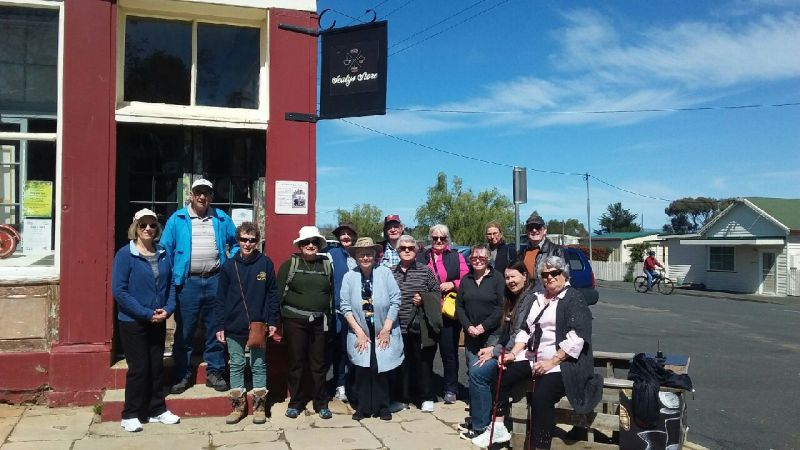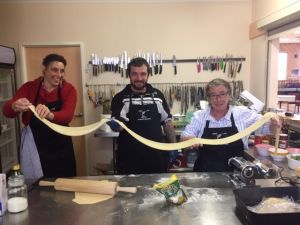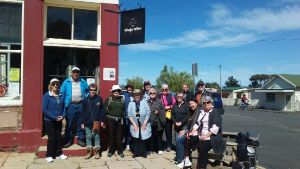Department of Health
A gateway to the strategies, policies, programs and services delivered by the Department of Health.
A Tasmanian Government and Community Partnership

The Highlands Healthy Connect Project has created a healthier, more active and socially connected community in the Central Highlands.
Run largely by the volunteer group Health Action Team Central Highlands (HATCH), the Project established a range of highly successful group activities aiming to encourage healthy lifestyles.
Tracey Turale, Health Promotion Coordinator at the Tasmanian Health Service Southern Region, said it has historically been a challenge to encourage healthy behaviour in this region.
The Central Highlands is a large rural area comprising just over 2 000 people spread across more than 800 000 hectares, with higher than average rates of unemployment, low wages and poor access to transport and services.
“It’s really important for people to have a social connection,” Ms Turale said.
“When activities and programs bring people together, it’s easier for them to exercise together and change habits together.”
The Highlands Healthy Connect Project offered a wide range of activities for local residents, including subsidised online fitness classes during the COVID-19 pandemic. The 15 people who took part reported their fitness levels and wellbeing increased during the pandemic due to the online classes.
Other activities included a community walking group, a men’s Eating with Friends group, cooking workshops, a health and wellness gym group and a coffee club.
 For many participants, the greatest benefit of these activities has been the chance for social connection.
For many participants, the greatest benefit of these activities has been the chance for social connection.
For example, a group of older community members who attended gentle exercise classes kept coming back, attracted by the social coffee afterwards, even though many had never attended a gym before. A new playgroup in Ouse connected around 20 young families that were not previously known were in the area.
During the COVID-19 pandemic, program participants chose to continue their outings using their own transport rather than supplied buses. A partnership with gym and fitness centre Freedom Health & Wellness provided online exercise classes and HATCH provided telephone support services for those facing isolation during the lockdown.
The Highlands Healthy Connect Project has helped people in the Central Highlands stay active and connected during the COVID-19 restrictions.
The Project was established to create a healthier, more active and socially connected community in the Central Highlands by providing a range of community activities such as fitness classes, walking groups and other social activities.
It found innovative ways to maintain and support community connections during the pandemic. It ran online exercise classes and created opportunities for social contact through physical activity classes and sharing a meal together after restrictions were lifted.
 For example, the project partnered with gym and fitness centre Freedom Health & Wellness, which ran online exercise classes that resulted in an increase in physical activity. Once restrictions were lifted, the classes continued online and face-to-face. In addition, a local Bothwell resident who recently trained as a fitness instructor was helped in offering classes to the local community in July.
For example, the project partnered with gym and fitness centre Freedom Health & Wellness, which ran online exercise classes that resulted in an increase in physical activity. Once restrictions were lifted, the classes continued online and face-to-face. In addition, a local Bothwell resident who recently trained as a fitness instructor was helped in offering classes to the local community in July.
“People who signed up have reported how much they appreciated being able to continue to exercise during restrictions,” said Tracey Turale, Health Promotion Coordinator at the Tasmanian Health Service Southern Region.
“Many of them have reported an increase in physical activity and they plan to continue the online classes after restrictions are lifted. Many of them are unable to attend classes at the gym at New Norfolk due to where they live, so this is providing a service that was not previously available.”
Other activities during the COVID-10 restrictions included:
Ms Turale said the community has responded positively to these measures with participants appreciating the opportunity to come together when it was safe to do so.
“The social contact was the most important part of these activities,” Ms Turale said.
“People accessing the online classes report feeling better than they have for a long time and would like these to continue.”

Young mother Rosie Fowler began weekly exercise classes to build up her strength when she was recovering from her third round of chemotherapy for leukaemia.
There are few opportunities for social interaction in Bothwell, a small town about an hour from Hobart where Rosie lives with her husband and 22-month old son. The classes gave her a great chance to meet other people while improving her health.
When the COVID-19 restrictions were introduced, the local Highlands Healthy Connect Project partnered with Freedom Health & Wellness to offer online exercise classes.
Rosie was able to do a variety of classes at home, ranging from high-intensity workouts to pilates and yoga. Some were livestreamed and recordings of previous classes were also available.
“It meant I could exercise every day and my little boy could play while I did it,” Rosie said.
“We were lucky when COVID was very strict because we have a large property and have a lot of space, but for your mental health you have to exercise. I always try and make the classes.”
The Highlands Healthy Connect Project offered subsidised fees to encourage people to sign up for the online classes. The 15 people who took part reported their fitness levels and wellbeing increased during the pandemic due to the online classes.
Project lead Tracey Turale said its success was due to the strong partnership with Freedom Health & Wellness, with both organisations working together to provide people with the easiest options to continue to be active.
Once restrictions were eased, online classes have continued as well as face-to-face classes run by a new fitness instructor with support of the Highlands Healthy Connect Project.
For Rosie, it’s meant a return to good health from the privacy of her own living room. “I still suck at push-ups – but I’m definitely feeling stronger!”
A life of shift work in Brisbane meant Russell Frith’s diet was never particularly healthy. But when he moved from the inner city to the remote community of Ellendale in the Central Highlands he found healthy eating nearly impossible.
“In Brisbane you have shopping centres all over the place. If you felt like spinach, you could pick up and be home in 10 minutes. Here it’s hard to get variety and it’s a chore when you’re cooking for yourself,” he said.
Then Russell got involved with the Highlands Healthy Connect Project. He’s been eating healthy frozen meals five times a week, delivered by volunteers throughout the Central Highlands.
He also volunteered to deliver the meals to nearby Ouse for distribution to those who can’t drive or access healthy food themselves.
Demand was especially high during the COVID-19 pandemic, when he was bringing more than 150 meals a week in his car from New Norfolk.
The Highlands Healthy Connect Project was established to improve the community’s health and wellbeing by encouraging social connection – and for Russell, that’s been the main benefit of his involvement.
He’s also heavily involved in regular coffee mornings, walking groups and exercise classes.
“There’s not a lot happening in town, but I’m always doing something,” he said.
“I’ve made lots of friends and I’ve never met so many women as I have since I’ve been down here. But the best thing is it’s given me something to do, which is constructive – it’s good for the soul, too.”
Community walking group gives Glenda an incentive to exercise
Glenda Jones, 62, didn’t have time to exercise when she worked 10 hours a day in a local supermarket. She put on weight and developed chronic conditions that made walking difficult.
But after she retired, joining a monthly walking group organised by the Highlands Healthy Connect Project has turned that around.
Every month, Glenda joins a group of like-minded walkers in different locations throughout the Central Highlands to walk for an hour, followed by a social get together over lunch.
“We all walk at our own pace – the ones who are really fit can go fast and the rest of us just walk at whatever is comfortable,” she said. “It’s heaps of fun, it’s a lovely outing and the company is great.”
The friendships and supports formed in the walking group have extended beyond the outings. Glenda encouraged an isolated friend to come along after the death of her husband, and the company and friendship have helped her to cope.
As well as the walking group, Glenda has joined other parts of the project including a coffee club, Ladies’ Day and regular Exercise in the Park.
Glenda is feeling healthier than she has in years. “I’m feeling much better – it’s all helping. I would like to carry on, and it’s given me the incentive to keep going,” she said.